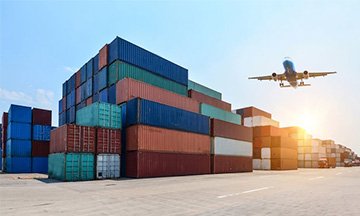International Freight Management Course
| Date | Format | Duration | Fees | |
|---|---|---|---|---|
| 02 Jun - 04 Jun, 2024 | Live Online | 3 Days | $1750 | Register |
| 09 Jun - 13 Jun, 2024 | Live Online | 5 Days | $2250 | Register |
| 15 Jul - 26 Jul, 2024 | Live Online | 10 Days | $4495 | Register |
| 23 Sep - 27 Sep, 2024 | Live Online | 5 Days | $2250 | Register |
| 25 Nov - 27 Nov, 2024 | Live Online | 3 Days | $1750 | Register |
| 15 Dec - 26 Dec, 2024 | Live Online | 10 Days | $4495 | Register |
| Date | Venue | Duration | Fees | |
|---|---|---|---|---|
| 14 May - 16 May, 2024 | Doha | 3 Days | $4100 | Register |
| 23 Jun - 27 Jun, 2024 | Doha | 5 Days | $4950 | Register |
| 01 Jul - 12 Jul, 2024 | Singapore | 10 Days | $9850 | Register |
| 09 Sep - 13 Sep, 2024 | Paris | 5 Days | $5695 | Register |
| 13 Nov - 15 Nov, 2024 | Barcelona | 3 Days | $4475 | Register |
| 09 Dec - 20 Dec, 2024 | Mauritius | 10 Days | $9375 | Register |
Course Overview
What is international freight management?
Freight management is a process that requires a crucial synchronization between operations, personnel, and technologies to manage a cost-efficient operation and impactful delivery of goods/freight. This process ensures that the right products get to the right destinations. This needs to happen in the right timelines, damage-free, and at the lowest possible cost. It does this by harmonizing the processes and activities between all stakeholders (carriers, distributors, vendors, and shippers).
Freight management is a broad function, that involves planning and executing shipments by all modes of transport. It requires an understanding of routes, rates, goods, customer expectations, carrier profiles, and risk management, whilst making arrangements for shipments, monitoring shipments, and managing transportation documentation. Freight network management requires the right combination of experience, skilled staff, and knowledge to ensure smooth coordination between carriers and shippers.
In today’s competitive environment, the capability to manage freight, in its leanest, fastest, and cost-effective operations, is more important than ever. This is due to constantly changing factors such as leaner shipper inventories, just-in-time manufacturing, rising warehousing and labor costs, tighter delivery timeframes, and consumer demands driven by eCommerce. As globalization continues to evolve, companies must continuously innovate and expand their expertise in accessing international markets. During these times of globalizing trade and commerce, knowing how to streamline processes, and understanding how to move freight across the world has become indispensable. International shipping remains intimidating for many new entrants, particularly for the SME industry. Larger firms, on the contrary, require skilled personnel to acclimatize quickly. Companies require focused training to bring personnel up to speed on how to navigate the complex world of international freight forwarding.
Globalization has brought immense changes to freight forwarding and management; and like all change, it brings both challenges and opportunities. Emerging technologies, higher customer expectations, and new innovative business models. There are many ways this sector could evolve and develop, to meet these challenges.
How do I start an international freight business?
This Zoe training course will provide professionals with an understanding of the unique requirements of international transportation and freight management. Participants will gain in-depth knowledge and insights into the core activities related to freight management. This can directly impact your company’s performance, operations, and revenues. This course also provides a view of the real-world challenges that importers and exporters face on a daily basis. Are you looking for an interesting and exciting career with a variety of work and advancement opportunities?
In that case, a career in transport and logistics could be ideal for you. Moreover, this course will equip you with the skills and knowledge that you need to take the first step with confidence!
Course Objectives
This international freight management course will teach participants how to appreciate and manage international shipping systems, processes, and documentation, as well as understand global shipping best practices. Participants will:
- Identify the increasing significance of freight management
- Understand its impact on both costs and service in business and commerce
- Have an in-depth understanding of international freight management procedures
- Understand documentation involved in the freight managemene process
- Provide participants with the knowledge and key skills to plan resources to succeed in international freight management
- Be able to create optimized work processes and incorporate leaner operations
- Be able to lower costs and improve turnaround times
- Improve understanding and management of supply chain risks in international trade
- Improve the required skill and knowledge to accurately plan and forecast resources
- Have the ability and willingness to incorporate changing global factors into key freight forwarding business strategies
Training Methodology
This collaborative International Freight Management Course will comprise the following training methods:
- Lectures
- Seminars & Presentations
- Group Discussions
- Assignments
- Case Studies & Functional Exercises
This Zoe course observes the ‘Do-Review-Learn-Apply’ model, like all other courses run by our specialised team.
Organisational Benefits
Professionals taking this course could benefit the organisation in a number of ways:
- Be able to analyze and implement the key areas of International Trade contracts and systems of import and export
- Be able to incorporate and learn the critical elements of logistics and supply-chain management processes based on the most relevant application in forward-thinking companies.
- Be able to identify and understand key performance indicators which will succeed in improving operations
- Taking powerful logistical decisions (e.g., facilities, inventory, and transportation) that impact the performance of the organisation as well as the entire supply chain
- Understanding of the strengths and weaknesses of various transportation modes to apply the right cost and service balance
- Gain a competitive advantage, over competitors, using new improved, and leaner ways of managing operations
- Increased product supply, distribution, and sales through international markets
- Increased profits and business growth by the use of transport channels effectively
- Understanding of the documentation requirements, and protocols to avoid any costly mistakes
Personal Benefits
Professionals who take this course will benefit in the following ways:
- Improved skill and knowledge to participate in cargo and freight forwarding planning
- Improved understanding, awareness, and knowledge on Logistics Planning & Management
- Increased awareness and perspective to choose the most effective approach or method when dealing with Import
- Be able to develop criteria and standards to achieve improved business performance
- Integrating and optimizing the total logistics and supply-chain process
- Capability to facilitate the team and framework for leaner operations
- You will be able to assits your company in developing a competitive infrastructure and synchronizing supply and demand
- You will learn to pace with evolving industry trends
- Obtain certification and international recognition for best-in-class practices
Who Should Attend?
This International Freight Management training program is intended to meet the educational needs of the following individuals:
- An organisation’s top management and executives who need to understand the freight management process
- Professionals who are new to the international transportation, trade, logistics, and supply chain industries
- Professionals and executives who are currently employed in the international transportation, trade, logistics, and supply chain industries
- Executives looking to advance their careers in international freight management
- Clearing and Forwarding Agent; Warehouse Supervisor, Shipping Documentation Supervisor
- Procurement and Sourcing Officers, who would be actively involved in the transportation of raw materials, goods, and freight
Course Outline
The course will cover the following areas:
Module 1: Supply Chain and Logistics Overview
- Supply Chain Overview
- Successful Supply Chains
- Supply Chain Relationships
- Roles Organisations play
- Types of Logistics
- Core elements of Logistics
- Supply Chain in a Logistics Environment
Module 2: Transport Management
- Transport Fundamentals
- Types of Transport Options
- Nature and Purpose of Transport Planning
- Transport Demand
- Transport Decisions
- Transport functionality
- Transportation principles
- Transport participants
- Transportation regulation
- Sustainability
- Transportation structure
- Transport economics and pricing
Module 3: Introduction to the Movement of Goods
- Types of Goods (Perishable Goods, Liquid Bulk, Dry Bulk, Dangerous Goods, etc.)
- Safe Handling of Goods
- Security of Goods
- Movement Methods
- Appropriate Modes of Transport
- Transport Planning and Scheduling
- Regulatory Requirements
- Collection, Storage, and Handling
Module 4: Freight Management
- Role of Freight
- Local / International movement
- Route Plan: Linear, Hub, Spoke system
- Environmental / Pollution
- External Influences
- Legislative
- Freight Performance Indicators
Module 5: International Freight Management
- Air Freight Forwarding Operations
- Sea Freight Forwarding Operations
- Concept of an Agile Port
- Facilities of a Multimodal Terminal, Processes
Module 6: Import & Export
- Key Elements of Export Strategies
- Key Elements of Import Strategies
- Third-Party Intermediaries
Module 7: Road Freight Management
- Role of Road Transport
- Road Freight Key Drivers
- Setting Standards and Performance Measurements
- Scheduling, Quality, and Security
- Route Planning
- Environmental Concerns
- Regulation Requirements
- Legislative
- Transportation Documentation
- Role of Management
- Effective Communication Skills
- Trade Barriers
Module 8: Air Freight Management
- Principles of Air Freight Management
- Advantages and Disadvantages of Air Freight
- Legislation and Regulations
- Policies and Procedures
- Customs & Excise
Module 9: Introduction to Ship and Port Operations
- Types of Ports
- Port functions
- Sea freight & ports | Advantages & Disadvantages
- Port considerations
- Seaport connection and transshipment
- Policies and Procedures
- Monitor Ports and Shipping
- Maritime network considerations
- External factors
Module 10: Sea Freight Management
- Principles of Sea Freight Management
- Legislation and Regulations
- The Role of Shipping Freight Operations
- Different Financial Strategies
Module 11: Operational Requirements for Customs & Excise
- Customs and Excise
- Terms & Customs Procedure
- Compulsory stops
- Clearing goods
Module 12: Lean Logistics
- The logistical value propositions
- The work of logistics
- Logistical operations
- Logistical operating arrangements
- Logistical synchronization
Module 13: Customer Service
- Principles & Importance of Good Customer Service
- Managing Customer Relationships Cultures of Customers
- Customer Focused Culture
- Points in a Customer Care Policy
- Evaluating Customer Service & Customer Satisfaction
- Managing Customer Complaints
- Using Customer Feedback
Module 14: Supplier & Client Relationship Management
- Types of Supplier Relationships
- Key Elements of the Supplier Relationship
- Policies and Procedures
- Monitor Supplier Relationships
- Internal and External Relationships
- Effective Supplier Relationships
- Effective Client and Supplier Relationships
Module 15: Risk Assessment and Management
- Risk assessment process
- Risk management strategy
- Analyzing the key drivers to risk
- Roles and responsibilities
- Improving visibility
- Reducing variability
- Maintaining velocity
- Enabling agility and synchronization
Module 16: Legal Issues in Freight Management
- Legal Framework of MTO
- Carriage of Goods by Sea
- Application—Carriage of Goods by Sea
- Introduction to Insurance & its Practices
- Cargo Policy Coverage
- Cargo Claims
- Carriage of Goods by Air
- Remedies & Enforcement
- Forwarders’ Liability Claims
- Handling Liability Claims
Module 17: Future of Freight Management
- Changing and emerging technologies
- Shipment Tracking Systems
- Internet of Things, Mobile Applications
- Enhanced GPS Accuracy
- Social Media
Module 18: Case studies
- Knowledge check exercise and quiz
- ‘Real world’ case studies and examples











